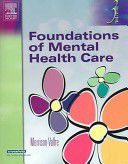Now part of the popular LPN Threads series, the updated 3rd edition of this textbook describes the essentials of mental health care spanning a wide variety of clinical settings. This book is known for its solid coverage of the foundations of mental health care, its emphasis on therapeutic care, and its chapter-by-chapter coverage of specific psychological and psychosocial problems. In addition to reinforcing the connection between mental health and the prevention of mental illness, this practical resource helps nurses and other health professionals care for clients who exhibit a wide range of maladaptive human behaviors. It also focuses on applying concepts of holistic care while helping clients develop more effective attitudes and behaviors.Case Studies with client-specific cases and accompanying thought-provoking questions encourage readers to consider the psychosocial aspects of providing care in a real-life context.A unique section of tear-out review worksheets in the back of the book provide extra practice with engaging exercises such as fill-in-the-blank, matching, multiple-choice questions, and crossword puzzles. Think About and Cultural Considerations boxes provide insight and thought-provoking points for classroom discussion. Drug Alert boxes throughout the book identify important points relating to psychotherapeutic medications. Multidisciplinary, client-specific Sample Client Care Plans include assessment, diagnosis, goals, therapeutic interventions, and evaluation - showing how members of the health care team work together to meet client needs. Appendices relating to the latest standards of mental health care include a list of DSM-IV-TR diagnoses, a tool for assessing the side effects of antipsychotic medication, and a mental status assessment tool.Full-color LPN Threads design includes LPN icons that highlight key information so students can identify special features in this book as well as others in the series.A new chapter on Cognitive Impairment, Alzheimer's Disease, and Dementia (Chapter 16) includes information on pathophysiology related to signs and symptoms, stages, treatments, structuring the environment, medications, therapies, physical, psychosocial care, coping with behaviors, and providing support for education for caregivers.Numbered lists of objectives begin each chapter.Key terms are listed at the beginning of each chapter with new phonetic pronunciations and page number references, highlighted in color at first mention in the text and defined in the glossary.Think About boxes throughout the text contain Critical Thinking Questions that challenge and strengthen students' understanding of the material. Key Points at the end of each chapter summarize concepts and call attention to important information.A complete bibliography and suggested readings, organized by chapter, is included in the back of book.
